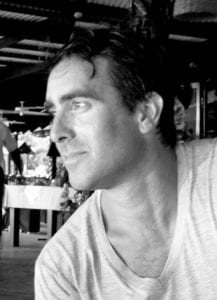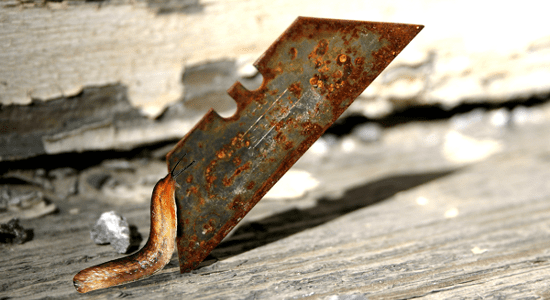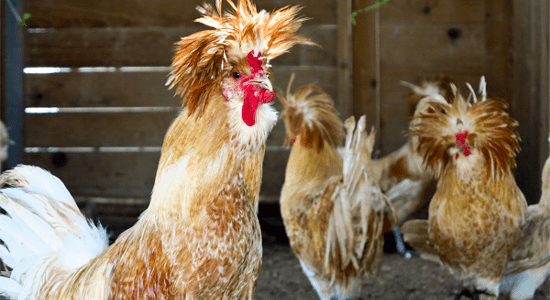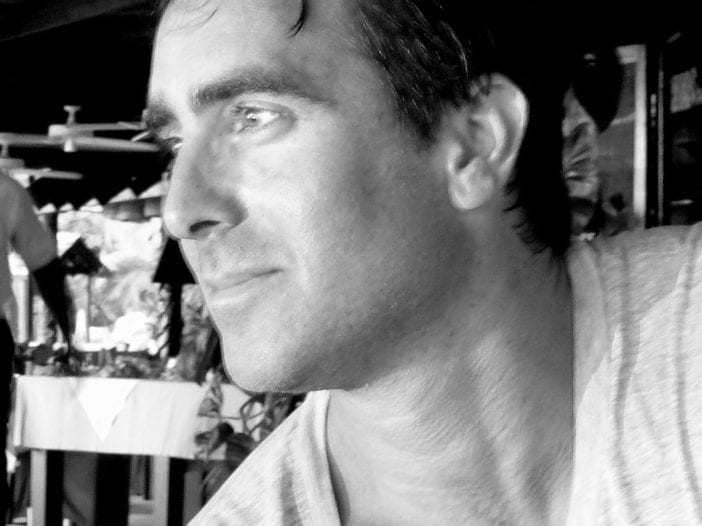I've been sitting on this leather bench in this cold, sterile room for a half-hour or so, just looking at you. You're leaning forward in your chair, wearing a single pearl that hangs straight down on a thin, silver necklace in front of your chest, clad in some funny colour scheme. And you're looking at me: your forearms stacked, and hands delicately cupping your elbows, finger nails left bare, showing nail beds that share a hue with your skin, thinking of some article in the Daily Mail on the socio-economic ramifications of our culture's quinoa craze, lamenting the state of the Bolivian farmer (who can't afford to keep a grain to feed his kids), and probably the state of your love life. And it's true, the softness of your expression does well to keep such thoughts on this and that between the two of us. Most others get red in the face, arguing about what it is you're "doing" or "saying," with your hands positioned as they are, or with that pearl around your neck falling as it does. Who cares about all that? You're thinking of a woman in the next room, herself a subject of this sort of gaze that commonly falls on your well-groomed, well-lit members of our history's upper crust. Quickly, my thoughts of you move to thoughts of your owner's: a well-groomed, well-dress, well-bred parliament of collectors of the fine stock. You and I both question their taste as we ponder that gaudy frame they've got you in. I think I'd change that.
Shorthand
It’s True (I Saw It on the Internet)
"Do the math, it's a false flag And don't even get me Started on the moon landing," He spits, alongside clots of chew, His mesh-backed trucker hat Sideways. (it's how he does his thinkin') Conspiracy theories elevated to Gravity or evolution, He says he's learned his ABC's, 1-2-3's and Ben-gha-zi's No— It's your theory. You do the math.
Business Sense
Next level company bonding At the annual retreat— This year, they have a Red Tent and childbirth simulation For the male employees. Don't like the direction the Company is taking? Maybe you just can't handle The pain of labour I hear they're forcing everyone to be Wholesome and whole-grain Because last year they hogtied Hodgson as a "trust" activity and He popped a tent that wasn't for sleeping. Back under fluorescent lights With syncing cycles, Conversation drifts and shifts from The dangers of high fructose corn syrup To which Uncle Ben's Tastes the best to even The most seasoned vet.
Writing Exercise
This is one I owe to the Argentinian writer Jorge Luis Borges, who said that the image of a slug crawling along the edge of a razor blade motivated him to write one of his stories. Nothing so strange or awful need animate our own work but images can often be, as they were for Borges, the originator of great stories.
So, think of an image, something that comes into your mind and holds your imagination. Ask yourself where it came from and why it has come to you. You do not need to write your story around the image. Rather, let it spark your imagination. This could be a 500 word assignment.
Chicken Killing in Israel
Kibbutz Gamorah sat at the top of a hill, not a jewelled crown with a castle on top but spread out like a garbage dump. I was sweating as I made my way towards its central grounds. The midday heat pounded everything except the cicadas into submission. There were no people round. It was completely deserted. I felt that something terrible had happened. That a plague had felled every man, woman and child leaving behind only the insects.
I picked up my bag and moved forward into the heat. I could see other buildings, white, stocky, angular, their solidity based on a lack of imagination; flights of fancy were left to the Arabs. The sun was ripping off the back of my head. I’d spent the last six months shivering in London and now I was going to spend the next six month sweating in Israel. There weren’t any dandelions to twirl around my fingers, no soft nape of land on which to lie down, no tall grass for my imagination to crawl through.
A dry cold blast of air hit me as I entered the closest building, chilling me to the bone. A woman with a checkered apron pushed a cleaning machine around the floor. It was like a giant slug, leaving behind a wet, polished trail. We were the only two in sight but there must have been more lurking in the background because my presence neither startled nor interested her.
“Are you one of the volunteers?” That sounded good. A title. I was somebody again. I nodded.
The volunteers were an odd assortment of lost youth from all over the world. There were a few Scandinavians, two Swiss, a token Japanese, an African and six Germans. I represented the Canadian flag and at times shouldered the entire responsibility of North America. We were in a state of exile and imprisonment—exiled from ourselves, imprisoned by that knowledge—and we had to find our own way out. I don’t think any of us, regardless of where we came from, had our heads screwed on the right way. We were a rag-tag army of confusion, a groping, complaining mass whose primary concerns were getting drunk and getting laid. Curiously, though, many of us had come to the kibbutz to do something productive, to feel wanted, important in a small but acknowledged way. It wasn’t a big wish but a forceful one nonetheless.
This idealism was dispelled within twenty—four hours. The kibbutz had initially set up a volunteer program to fetch young people from around the world and bring them within the communal and socialistic fold. It didn’t work. Basically, it had become a hospital for the ruined, the ravaged and the tired. The place stunk of forgotten dreams. It suited me fine.
Six months before I arrived there was another Canadian who used to steal the only horse of the kibbutz and ride naked through the residential area. This happened at least once every two weeks and, according to his whim, he would either ride at a slow trot singing country and western songs or gallop at a mad pace, screaming “The British are coming! The British are coming!” Needless to say, this form of behaviour deeply unsettled the older kibbutzniks who were especially upset by the horse shit which greeted them in the morning after his rides.
There was also Paul the Australian who left two weeks after I arrived. Everyone seemed to have an opinion about the emotional stability of Paul. He drank like a fish and strung four letter words together with such angry facility that I wondered if he hadn’t invented a hybrid language of his own. Paul used this hybrid language to sexually harass every female in the entire kibbutz. Old or young, it didn’t matter to him.
The relationship between volunteers and the kibbutzniks was tense. There were a bunch of us and we would converge in the dining hall with an intensity and imperialism to such a degree that for the first moments we seemed to own the place. To get at our food we’d push and shove. All of us would occupy three to four tables in the dining hall and would inhale our food, swoop down for seconds, stagger over for thirds and then push our plates away in utter disgust. Half digested chicken swimming in gravy. Herring nestled in a mountain of mashed potatoes. It was every man for himself, the underbelly of capitalism. Why didn’t the kibbutzniks just whip us, tell us we were scum, little shits.
Instead Ami, our work manager, would show us slides of the kibbutz. Little history shows. We jeered, snickered and Ami would shuffle quietly out of the room, sad and embittered. He was a short little stump of a man with sallow skin who had to get his blood cleaned every week on a dialysis machine. Just before treatment he was as green as moss. We called him the little green leprechaun and wondered whether he glowed in the dark.
Soon after we had arrived, a large thick-set healthy-looking Israeli came to our table in the dining hall, informing us in a gruff overbearing manner that, commencing tomorrow, three of us—Kesa, Gunther and I—would be working in the chicken house. We’d already heard about this hellish work assignment and knew that none of us could escape.
Early the next morning we arrived at the massive steel door which protected the chicken house. It took three men to pull it back and as they passed by I could smell their sweat. We peered into the darkness. A line of light bulbs slithered towards the back of an enormous shed, each emitting a sickly piss-yellow halo. The last light we could see was almost engulfed by the thick acrid air. I squinted in order to see farther but it was impossible to see the end, even somehow to comprehend it. I wondered what lay beyond, past that last faint light bulb. Past the darkness.
“I don’t see anything,” said Kesa nervously. Kesa had sold peanuts in Nairobi and jumped ship in Mombasa. He was so black he was almost purple and he had the most sorrowful eyes I’d ever seen.
“Neither do I.”
“Where are all the fucking chickens?”
We leaned forward as if another few inches would put anything into focus. In our confusion we stared up at the ceiling but still we could see nothing that was identifiable as chickens. We waited, suspended in silence and darkness for what seemed hours. I began to feel queasy, even sea-sick.
“Gunther,” I whispered.
“What?”
“The floor, look at the floor. It’s moving.”
Gunther wiped his brow with the collar of his shirt and leaned farther into the darkness.
“Jesus Christ.” He said it with such awe, even reverence, I thought he was going to cross himself.
“It’s a sea of chickens, wall to wall. Can you believe it? Can you fucking believe it?”
The cold sputtering of a generator started up. Then two powerful searchlights seared the darkness. Engines turned over, kibbutzniks barked out commands, huge crates were dragged across the trampled ground. Everyone rushed past Gunther and me with arms outstretched as if they were going to snap chicken necks right there and then.
“Hello, chickens.” My knees were bent and I was crouching within a sea of chickens. I stared at one, a large particularly ugly one whose main concern seemed to be in avoiding my open hand as I bent to pet it. It buried its head under the body of its neighbour.
“I won’t hurt you.” This was my mother talking. I was borrowing the loving voice that had coddled and protected me all my life and now I felt ashamed that I had perverted that bond between us. I started to laugh.
“I mean I’m going to hurt you very much. Very, very much, but I don’t want to.” It seemed not to make the slightest impression on the chicken. It was asleep.
Men were rushing by, five chickens in each hand. I watched how it was done, how you slid your hand underneath the chicken’s belly and grabbed its legs, how you passed it over to your free hand, how you held the chicken in your clenched fist. The really good men, the ones with experience, could do it all with one hand.
I looked back towards my sleeping chicken. It seemed oblivious to all the activity.
“Don’t you know you’re going to die?” I asked in my most soothing voice. But still it slept. “Now don’t be upset. I’m just going to slide my hand under your belly.”
I felt the narcotic warmth of its skin surround my hand and move up my arm. It filled my whole body. But men were rushing by in a flurry of activity and I knew I had to push my fingers farther.
My hand moved down until my outstretched finger touched something hard. The chicken woke up, freed its head and lunged for my arm. It pecked me with its beak just above the wrist and I retracted my hand in horror.
“You fucking bastard!” I yelled. “What the fuck do you think you’re doing?” This time, without thinking, I thrust my hand under its belly and yanked its legs in anger. I grabbed another chicken and then another until I had three chickens dangling from one hand. Gunther rushed past me, saw that I had succeeded and grinned. He was carrying three in one hand and two in the other.
“Can you believe how stupid they are? They fall asleep in your hand. Asleep!”
He seemed inordinately happy at the idea.
After the fourth or fifth trip, I forgot they were chickens, that they were warm, that they had any life at all. I moved back and forth mechanically, scooping up objects and counting off to men behind the crates.
“How many?” they yelled.
“Five.”
“How many?”
“Eight.”
“How many?”
“Six.”
There were so many chickens stuffed into each crate that their legs stuck out. They were placed on top of a truck where the wind ruffled their feathers and the driver waited for the command to drive all his chickens to the slaughter-house. Still, I thought, despite an odd sadness on their faces, the chickens seemed more bothered than scared.
Then I heard a voice. It was high-pitched, grating and very loud.
“Momma! Momma!”
It was funny at first and everyone laughed but Kesa wouldn’t stop. He seemed lost within that voice. The embroidered skull cap he wore was almost falling off his head.
“Momma, Momma! Where are you, Momma?” He was becoming hysterical, unable to grasp the casual brutality of the scene around us. His face was caked with dried piss and chicken feathers and tears rolled down his neck. He held something he couldn’t stop caressing, coddling, cradling.
“Look,” he said. He held out his hands, Nestled in his palms was a baby chicken with soft yellow feathers and dark liquid eyes.
“What am I going to do?” He began to stroke its head delicately with the tip of his fingers.
“Kill it.”
Kesa drew the chicken back to his chest.
“I can’t kill it!”
“Then save it, save it as a token of our goodwill.
Kesa began to back away.
“Kesa?”
“Yes?”
“Slip it under your shirt, walk out and set it free.”
“Do you think it will live?’ His voice had the eagerness of a child’s.
“No, but at least it’ll have a chance.”
Gunther’s body was silhouetted by the searchlights which gave him a hulking, menacing quality. Standing in front of me, the harsh light blinding my eyes every time I moved out of his shadow, it occurred to me that he’d gone mad. He was breathing rapidly and his shirt was stained with chicken shit, chicken piss and his own sweat.
He stood there, towering over me.
“Let’s kill some chickens.”
I didn’t understand.
“I thought that’s what we’re already doing, catching them to be slaughtered.”
“No, no,” he said impatiently. “I mean with our own hands.”
We went so far back in the shed that the searchlights filtered down to an eerie incandescence. We stood there, not too sure any more why we had come. There was a tense silence. We were both about to make a confession about ourselves, to play both roles—judge and judged. I looked to him for further instructions.
“Let’s throw them against the wall.”
“Okay.”
Gunther grabbed hold of a plump chicken. “Go ahead, pick one up.”
I lifted a chicken. It looked unbearably old.
“Are you ready?”
“Yes.”
“One, two, three . . . ”
Half-heartedly we threw them against the wall. The two chickens simply flapped their wings and flew away.
“Harder,” I heard Gunther say. “We have to throw them harder real hard.”
“I know, I know.”
This time we hurled the chickens with all our might.
There was a hard thump against the wall and you could almost feel the muscles bruise and the bones shatter as the chickens fell lifeless to the ground.
“Fucking chickens,” Gunther muttered. “Fucking chickens. I’m going to kill you all. Do you hear? Every last fucking one of you.”
He picked up another one and threw it with such violence that I heard its neck crack before it ever left his hand. I didn’t understand what was happening, why I was so angry, what I was doing here or how this had happened, but I knew I hated those chickens.
“Fucking chickens!” I screamed and threw another one against the wall, then another and another. It was a massacre. When it was over, when I felt the anger drain from my body, I slid my back down the wall, tucked my knees up and propped my arms over them, creating a ledge for my head to rest on.
*
My body felt sore and sweaty, a sticky sweat that had come with the night. I could feel the heat radiating from my skin as if I was giving back what I had taken in during the stay. With each beat of my heart, I tried to push the heat out from my belly, from my temples. It became unbearable, as if boiling water was seeping through my pores, turning to steam.
Chana lay by my side, but I felt her presence to be an intrusion, an entanglement. Her mysterious world seeped into me, creating emotions that strapped me down. I looked at her. She lay asleep, her arms tucked around her belly, like chicken legs, I thought, and for a moment I had an impulse to slide my hands underneath her body and yank.
I slept for days, dreaming of birds trying to peck me. Nothing touched me, nothing disturbed me. I had found not the world I’d imagined, but the world that had imagined me. That night I left Kibbutz Gamorah and walked down the hill to the valley floor. Outside the kibbutz’s perimeter lay the Golan and beyond the Golan lay Syria—menacing, unpredictable, wild. I stood at the edge of the road. The air was pungent, alive, mysterious. The valley heaved forward, a great expanse of rich soil. A car rushed past me, a small cubicle of light slicing the darkness, sounds of music twirling in the air and then silence. Within the surrounding silence, the hills of Galilee were darker still, like a fantastic tidal wave waiting to crash over us all.
Author of the Month: David Layton

Tell us about yourself.
I have a book coming out next year with HarperCollins called Kaufmann & Sons. I teach at the creative writing department at York University and also do some work with the University of Toronto through their Continuing Education Department.
When did you realize you had a passion for writing?
I grew up with writers and poets and that should have inoculated me against any desire to write. Unfortunately, I sat down and wrote a novel just after I turned 20. It had something to do with wanting to impress a girl I was dating. We broke up some point after I’d written the third chapter and by then it was too late to stop.
What pieces of writing/authors have had the greatest impact on you?
The first book I truly loved was a Bitter Lemons by Lawrence Durrell. It’s about the Cypriot revolt against the British in the 1950s. At the time I didn’t really know the British had even been in Cyprus but the book made me feel as if I did know, and that made me feel wise. I learned that that feeling was the gift of a good writer.
How and when do you find time to write?
If you go looking for time you’re not going to find it. I force myself to write every day for three hours. I’ve also learned to be wary of any inspiration obtained at 2 am, so I work in the morning.
What has been some of the biggest challenges you’ve faced as a writer?
Procrastination, laziness, fear of failure. These are my three Horses of the Apocalypse.
How have you changed as a writer over the years?
I’ve developed a few grey hairs.




